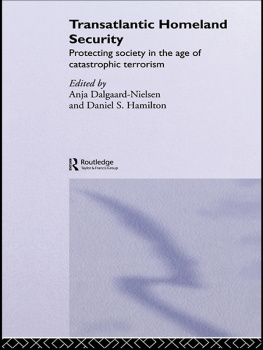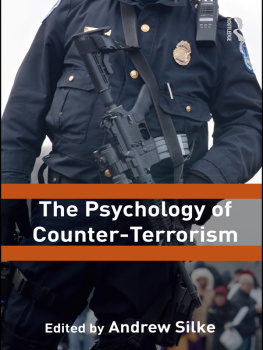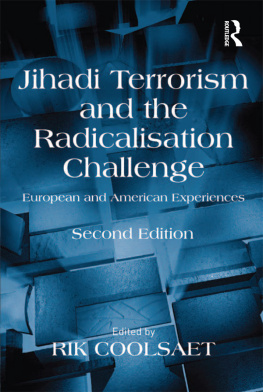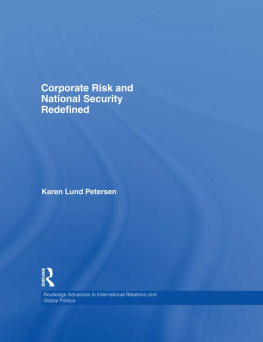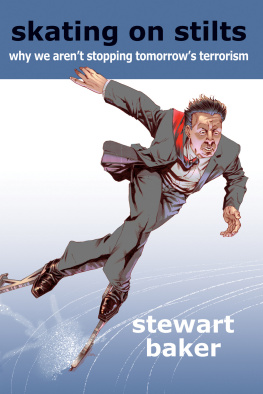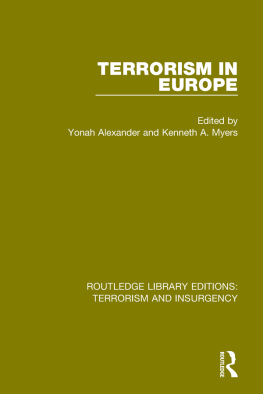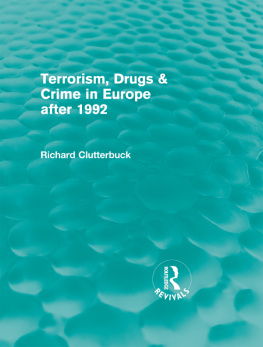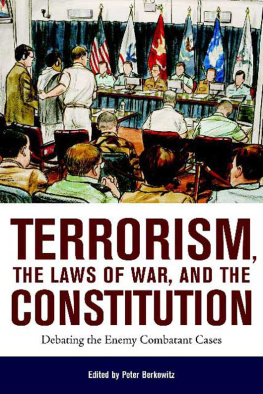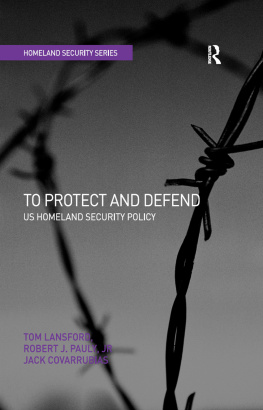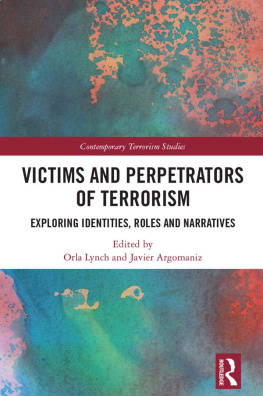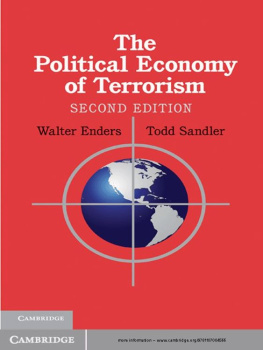Transatlantic Homeland Security
Europe and the United States have reacted differently to the emergence of catastrophic terrorism and occasionally squabbled over how to deal with this new threat. Yet an effective response to a transnational problem has to be international. The premise of Transatlantic Homeland Security is that the ultimate effectiveness of efforts to prevent and protect against large-scale terrorism will be contingent on the ability of the US and its European partners to overcome their differences and cooperate closely.
This book explains the concept of homeland security and the international requirements of success within areas such as:
- efforts against nuclear and biological terrorism
- protection of critical infrastructure
- defence against cyber-terrorism
- border and transportation security
- law enforcement efforts.
Moreover, it discusses how to integrate intelligence in the homeland security effort while protecting civil liberties and the right to privacy.
Transatlantic Homeland Security attempts to provide conceptual and practical guidance to analysts, policymakers, and practitioners at a crucial time when homeland security efforts should move beyond a still dominantly domestic focus. This book is essential reading for those with professional and research interests in security policy, counterterrorism, and international relations.
Anja Dalgaard-Nielsen is Senior Fellow at the Danish Institute for International Studies and Non-Resident Fellow at the Center for Transatlantic Relations at the Paul H.Nitze School of Advanced International Studies (SAIS), Johns Hopkins University. Daniel S.Hamilton is Richard von Weizsaecker Professor and Director of the Center for Transatlantic Relations at the Paul H.Nitze School of Advanced International Studies (SAIS), Johns Hopkins University; and Executive Director of the American Consortium on EU Studies (ACES).
Transatlantic Homeland Security
Protecting society in the age of catastrophic terrorism
Edited by Anja Dalgaard-Nielsen and Daniel S. Hamilton
First published 2006 by Routledge 2 Park Square, Milton Park, Abingdon, Oxon OX14 4RN
Simultaneously published in the USA and Canada by Routledge 270 Madison Ave, New York, NY 10016
Routledge is an imprint of the Talor & Francis Group
This edition published in the Taylor & Francis e-Library, 2005.
To purchase your own copy of this or any of Taylor & Francis or Routledges collection of thousands of eBooks please go to http://www.ebookstore.tandf.co.uk/.
2006 Selection and editorial matter, Anja Dalgaard-Nielsen and Daniel S.Hamilton; individual chapters, the contributors
All rights reserved. No part of this book may be reprinted or reproduced or utilized in any form or by any electronic, mechanical, or other means, now known or hereafter invented, including photocopying and recording, or in any information storage or retrieval system, without permission in writing from the publishers.
British Library Cataloguing in Publication Data A catalogue record for this book is available from the British Library
Library of Congress Cataloging in Publication Data A catalog record for this book has been requested
ISBN 0-203-00796-4 Master e-book ISBN
ISBN 0-415-36032-3 (Print Edition)
Notes on contributors
Morten Bremer Maerli is a researcher at the Norwegian Institute of International Affairs. He works on nuclear non-proliferation and prevention of nuclear terrorism. Dr. Bremer Maerli is a physicist by training, and has had both practical and research experience in the fields of nuclear safety and security. From 1995 to 1999 he worked at the Norwegian Radiation Protection Authority, with control and protection of nuclear materials as his prime responsibility. Through his work he has gained regional knowledge and extensive experience of the practices concerning the handling, storing and security of nuclear materials in Northwest Russia. He has served as a technical consultant to the Norwegian Ministry of Foreign Affairs, for example at the Conference on Disarmament, at the 2000 Review Conference, and also on the 2002 Preparatory Committee of the Treaty on the Non-Proliferation of Nuclear Weapons. During the 1999/2000 academic year, Bremer Maerli was a Fulbright Science Fellow at the Center for International Security (CISAC) at Stanford University. The subsequent year he was a Visiting Research Scholar at Sandia National Laboratories, California. Dr. Bremer Maerli is a member of the Norwegian Pugwash Committee and of the International Network of Engineers and Scientists Against Proliferation (INESAP).
Esther Brimmer is Deputy Director and Director of Research at the Center for Transatlantic Relations at the Paul H.Nitze School of Advanced International Studies (SAIS) at The Johns Hopkins University. Dr. Brimmer has served in the United States government and in international affairs think tanks. From 1999 to 2001 she was a Member of the Office of Policy Planning at the US Department of State, working on the European Union, Western Europe, the UN, and multilateral security issues. She also served on the United States delegation to the United Nations Commission on Human Rights in spring 2000. From 1995 to 1999 she managed projects as a Senior Associate at the Carnegie Commission on Preventing Deadly Conflict. From 1993 to 1995 she served as a Special Assistant to the Under Secretary of State for Political Affairs working on UN, peacekeeping, human rights and politicalmilitary issues. Her publications include The United States, the European Union and International Human Rights Issues. Dr. Brimmer received her PhD and MA in international relations from the University of Oxford, and her BA in international relations from Pomona College in Claremont, California. She is a member of the Council on Foreign Relations and Women in International Security.
Anja Dalgaard-Nielsen is a Senior Fellow at the Danish Institute for International Studies (DIIS), Non-Resident Fellow at the Center for Transatlantic Relations at the Paul H.Nitze School of Advanced International Studies (SAIS), Johns Hopkins University, and lecturer at Denmarks International Study Program, University of Copenhagen. Dr. Dalgaard-Nielsen has previously worked as Washington Analyst and Coordinator for the Aspen Institute Berlin. She holds a PhD and MA from the Paul H.Nitze School of Advanced International Studies (SAIS), Johns Hopkins University, a BA/MA in Political Science from the University of Aarhus, and has done graduate work at the Ruprecht-Karls Universitt, Heidelberg, and Universit di Bologna. She has published on topics including counterterrorism, homeland security, European security and defense policy, and German security policy, and is a frequent commentator in the Danish printed and electronic media.
Daniel S.Hamilton is Richard von Weizsaecker Professor and Director of the Center for Transatlantic Relations at the Paul H.Nitze School of Advanced International Studies (SAIS), Johns Hopkins University, and Executive Director of the American Consortium on EU Studies (ACES). He is the publisher of the bimonthly magazine Transatlantic: Europe, America & the World, and Principal Advisor to the Congressional Caucus on the European Union. Dr. Hamilton was the co-leader of Atlantic Storm, a table-top bio-terrorism exercise mimicking a transatlantic summit of presidents and prime ministers from Europe and North America who must respond to a bio-terrorist attack. He is the US Chair of the Euro-Atlantic Strategy Group for the 46-nation Partnership for Peace Defense Academies Consortium, and is a board member of various transatlantic NGOs and foundations. He has served as Deputy Assistant Secretary of State for European Affairs, Associate Director of the Policy Planning Staff for Secretaries of State Madeleine Albright and Warren Christopher, Policy Advisor to Assistant Secretary of State for European Affairs Richard Holbrooke, Senior Policy Advisor to Ambassador Holbrooke and the US Embassy in Germany, US Special Coordinator for Northern Europe, and US Special Coordinator for Southeast European Stabilization. Dr. Hamilton has a PhD and MA from the Johns Hopkins School of Advanced International Studies. He received his BSFS from Georgetown Universitys School of Foreign Service. He has authored or edited many published works, including

